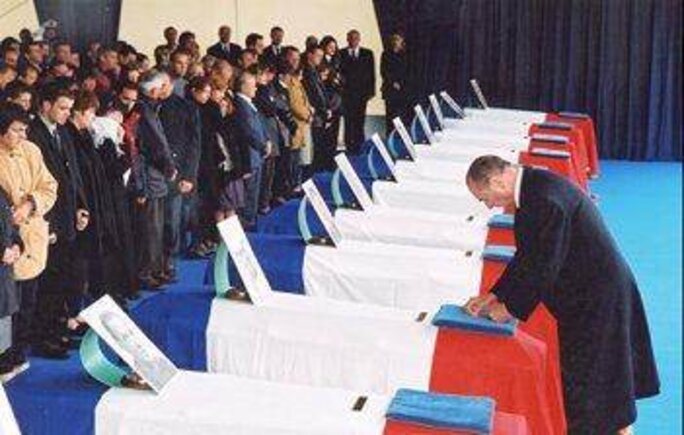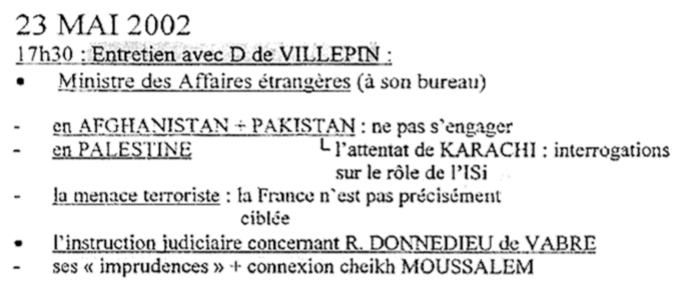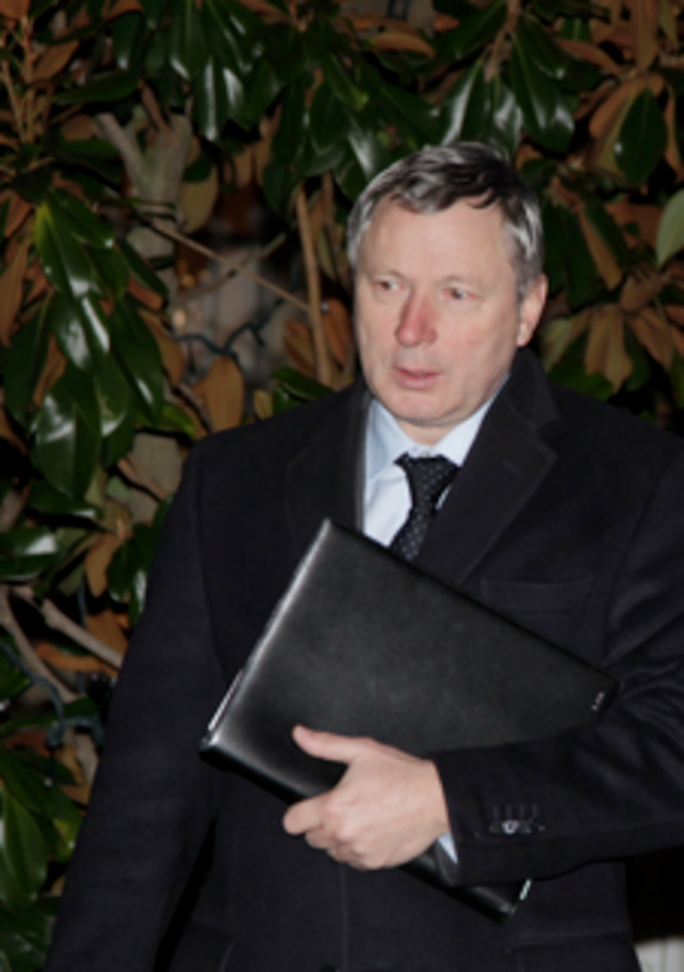Key French intelligence reports into a bomb attack in Karachi in 2002 which left 15 people dead, including 11 French naval engineers, were kept secret by the French government for nearly nine years, Mediapart can reveal.
The contents of the three documents, which Mediapart has gained access to, further fuel suspicions of a high-level cover up in France that has prevented a conclusion to the judicial investigation into the engineers' murders.
Disturbingly, they appear to confirm suspicions that the attack was carried out in retaliation for the non-payment of significant bribes promised by France to local intermediaries to secure the sale to Pakistan of three French submarines. Evidence increasingly suggests these were also part-destined for illegal party funding in France, and were blocked by former President Jacques Chirac to starve his principal political rival of funds.
For years, the French and Pakistani authorities have leant credence to the theory that the murders of the engineers were the result of a terrorist attack by Islamic extremists. However, two ongoing Paris-based judicial investigations now focus on a financial motive - and the engineers' families have publicly voiced suspicions that its far-reaching consequences in France have led to a high-level cover-up.

Enlargement : Illustration 1

Evidence, including the testimony of a former French defence minister, suggests the chain of events that led to the attack originated in a decision by Chirac to block all the bribes on the belief that some of them returned to France, via elaborate offshore routes, to finance former prime minister Edouard Balladur's party finances. Chirac ordered the stopping of payments of the so-called commissions immediately after he beat fellow conservative right rival Balladur in the 1995 presidential elections.
President Nicolas Sarkozy was, in the run-up to the elections, Balladur's budget minister and his presidential campaign director. For a simplified A-Z of the events and ramifications of what has become known as the Karachi affair, please click here.
The documents revealed here by Mediapart show that the French intelligence service - the Direction générale des services extérieurs, the DGSE - suspected from the very day of the suicide attack on 8 May, 2002 that it was instigated for financial motives.
They also show that the French secret services rejected from the outset the theory that the Islamic terrorist movement al-Qaeda were behind the attack. Yet this was precisely the line of inquiry pursued from the start by the controversial former French magistrate Jean-Louis Bruguière, who was in charge of investigating the murder of the French nationals from 2002 until 2007, when he left the judiciary to pursue a political career with Sarkozy's ruling UMP party.
The three documents in question, dated 8 May 2002, the 11 May 2002, and another on 16 September 2004, are contained in the archives of the DGSE. In mid-January this year they were handed to investigating judge Marc Trévidic, who since taking over from Bruguière in 2007 has re-launched the investigation, focussing on the financial link.
This concerns the payments of significant bribes for the sale, agreed in 1994 when Balladur was prime minister, of three Agosta submarines to Pakistan by French naval defence contractor DCN (Direction des constructions navales). The engineers murdered in 2002 were working on the completion of the contract, helping to build one of the submarines in Karachi's naval shipyards.
Alongside Trévidic's investigation into the murders, another investigating judge - Renaud Van Ruymbeke - is investigating whether some of the commissions from the sale made their way back into France in the form of illegal retro-commissions to help fund the party of the then-outgoing prime minister Balladur, both in his failed 1995 presidential campaign and afterwards.
These crucial documents, kept secret from Judge Trévidic until now, were finally received after several requests made by the magistrate, when their 'classified' status, justified as being sensitive to national defence interests, was finally lifted. Since changing the focus of the inquiry in 2008, the judge has had little cooperation from the French government which has provided him with only a slow and selective de-classification of documents.
Al Quaeda theory was 'suspicious and strange'
Moreover, while the anti-terrorist judge has recently received a total of 26 of the documents he has been seeking, he has been refused access to another 28 by Minister of Defence Alain Juppé, acting on the recommendation of the body that oversees defence secrets, the Commission consultative du secret de la défense nationale (CCSDN).

However, President Nicolas Sarkozy along with ministers directly concerned by the judge's requests - Hervé Morin when he was defence minister and Michèle Alliot-Marie, the former justice minister, now foreign affairs minister - have previously given public reassurances that all the documents of interest to Trévidic's investigation had been put at his disposal.
This is now clearly untrue, given that the report by the French foreign intelligence services, the DGSE, written on the very day of the Karachi attack, was only presented to the judge this January, following the latest of his repeated requests for the documents in November. Michèle Alliot-Marie was, in all logic, aware of its existence as it was written when she had just been appointed as defence minister, a post which places her in charge of the DGSE.
Meanwhile, out of the 40 DGSE documents that the government earlier agreed to de-classify at the request of Judge Trévidic, in July 2009, not one included a mention of the Agosta contract nor the suspicions of corruption linked to it.
For months, several of the Karachi victims' families, represented by lawyer Olivier Morice, have denounced the regular "obstacles" put in the way of the investigation by government, illustrated by the disclosure only now of documents written in May 2002 and September 2004. Their criticisms have been supported by, Bernard Cazeneuve, Socialist Party Member of Parliament for the Channel port of Cherbourg, where the engineers were based and where most of their close relatives live. Cazeneuve, rapporteur for the French parliament's mission of enquiry into the Karachi attack, has been outspoken in his protests at official obstruction of in the investigation.
The first of the three documents finally released, numbered NR 735, clearly entitled "Karachi attack", was written by a DGSE agent in the hours following the bombing on 8 May 2002. It was based on confidential information from one of the service's sources, whose name has been removed.
The document begins by noting that "the attack against French nationals at Karachi does not bear the hallmarks of an operation mounted by al-Qaeda".
It continues: "It is probable that the al-Qaeda organisation would in the first place attack American or British nationals. The suicide attack this morning is similar to other attacks perpetrated by terrorist groups based in Pakistan, such as Harakat Ul Mujahedin, Jaish e Mohammed, Lashkar E Tayyaba, Harakat Ul Jihad orAl Saiqa." Some of these are linked to the ISI, the principal Pakistani intelligence agency.
As Mediapart has already reported, a note by retired general Philippe Rondot, a former ranking French foreign intelligence officer, an adviser on intelligence and special operations (conseiller pour le renseignement et les opérations spéciales, or CROS), revealed as early as 23 May 2002 the existence of "questions over the role of the ISI" in the Karachi attack. According to Rondot, France at that time was not "precisely targeted by the terrorist threat" (see below).

Enlargement : Illustration 3

The DGSE document of 8 May 2002 says that "if the attack specifically targeted French nationals, we cannot rule out the possibility of a financial line of enquiry". If the choice of words is cautious, the rest of the document shows that the secret services gave credence to this line of enquiry from the start.
The same report continues: "In Pakistan military contracts are 'famous' for bribes and commissions demanded by Pakistani officers and politicians. The French nationals who were killed were engaged in the supply and construction of submarines made by a French company."
The DGSE notes the existence of "rumours" which "mention commissions paid to the brother of General Musharraf or to General Musharraf and to his wife". This is a reference to General Pervez Musharaff, president of Pakistan from 2001 until 2008.
It continues: "The couple are said to have invested this money in the purchase of a house in the United States. The contract had been signed while Benazir Bhutto was prime minister, but persistent rumours spoke of the existence of bribes paid to officers (of the army or navy) and to the brother of General Musharraf, who lived in the United States." (Bhutto, assassinated in December 2007, was prime minister from 1993-1997, and was the wife of the current Pakistani President Asif Ali Zardari).
These various elements, providing a potential link between the Karachi attack and the Agosta contract, are reinforced by other documents. Notably a fax addressed on 9 May 2002 to the US consulate's security officer in Karachi, Rendall Bennett, in which his assistant, Bashir Zahooruddin, informs him that "Naval officers are convinced that this attack was aimed at scuppering the Franco-Pakistani project of building the submarines"1.
In the same DGSE report dated 8 May 2002 , it suggests that "it is suspicious and strange to note the eagerness of Pakistani officials - close allies of Musharraf - to accuse the al-Qaeda organisation and equally India, and this in the minutes that followed the explosion of the car bomb at the Sheraton," referring to the hotel in the centre of Karachi where the majority of the DCN workers were staying. The suicide bomber blew up his vehicle stuffed with explosives beside a minibus in which the engineers were seated, ready to leave for work at the Karachi naval shipyards.
------------------------
1: This is a translation of an official French translation from the original English.
A surprising French intelligence U-turn
Three days later, on 11 May 2002, the French secret services issued a new report concerning the "hypotheses" about those "responsible for the Karachi attack". According to the DGSE's source - apparently different to that earlier mentioned - India "can be considered as one of those possibly responsible for the attack on 8 May 2002".
It then goes on to consider "unlikely" the theory that "Pakistani Islamic groups or their recently-outlawed armed wings" were behind the attack. "According to the source [they] would have had no interest in attacking French nationals."
The DGSE report continues: "In any case, the involvement of France in operations alongside American forces in Afghanistan cannot on its own explain such an act. The absence of a claim [of responsibility for the attack] and the suicide nature of the attack reinforce the source's conviction of foreign involvement."
One theory appears to remain constant - that al-Qaeda was not responsible. "Concerning al-Qaeda, [the source] insisted on stating that he was still not convinced of the involvement of Osama Bin Laden, described by him as a man living in caves who had no means of modern communication," the report adds.
Two years later, in a document dated 16 September 2004, also until now a classified document, the DGSE took stock of the progress of the Pakistani investigation into the Karachi attack, an investigation which has since been discredited1.
Under a section titled "Comments" the DGSE report clearly states: "The involvement of al-Qaeda is definitively ruled out in [...] the attack of 8 May 2002 in Karachi against the DCN." Other attacks were also cited. "Those responsible for these operations...as well as a certain number of other smaller-scale attacks in Karachi are all Pakistanis. All belong to the volunteers who have fought for several years alongside the Taliban in Afghanistan."
Further on it notes: "The absence of foreigners in the preparation and execution of the operations cited earlier is in line with the instructions of Osama Bin Laden who had forbidden his combatants to carry out attacks in Pakistan."
The DGSE reports appear to back Judge Trévidic's theory of a possible financial motive for the attack, and that the involvement of al-Qaeda can be excluded.

However, among the first of the declassified documents handed over to Trévidic in October 2009 figured a more recent DGSE report, dated 3 February 2009, which surprisingly drew a quite different conclusion. "Targeting the DCN in Karachi allowed these terrorists connected to al-Qaeda both to hit a target linked to the Pakistani military and security complex, in reprisal for the alignment of Pakistan with the anti-terrorist rhetoric of Washington, and at the same time to strike against a Western ally of the United States engaged militarily in Afghanistan," it reads, concluding: "If the identity of the person [behind the attack] remains unknown, their membership of al-Qaeda is not in doubt."
The current director-general of the DGSE, Erard Corbin de Mangoux, was appointed to the job in October 2008. Prior to that, he worked as an internal affairs advisor to President Sarkozy, with whom he is described by the French media as being "close".
-------------------------
1: On 30 June 2003 three men were condemned to death by a court in Pakistan for their part in the attack. Six years later they were acquitted.


